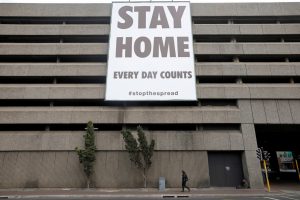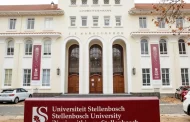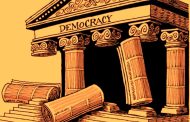Are African countries copying blindly the theory and practice of lockdown or not? Is lockdown a case of generals always fighting the last war, (using Ebola tactics to fight Coronavirus?) instead of smart, new ideas and policies in respect of COVID-19? A product of Fourah Bay College; the Institute of Social Studies @ The Hague, a retired UN Consultant and the author of this piece argues his point of departure.
By Herbert M’cleod

The author
It is curious how COVID 19 takes us back to our mammalian origins. When mammals are threatened and fear sets in, they congregate and each follows the herd – safety in numbers. COVID 19, can be compared to an alien invasion; we first unleash our traditional defense weapons against it without success. Out of fear, we follow what others do, disregarding the evidence. Meantime, the goons try to learn all about it.
So we petty countries all look at what the “big” countries are doing and we follow, notwithstanding some setbacks they encounter and ignoring differences in our conditions. These countries must be right; after all they have all the scientists and facilities, we say.
We, therefore, see authorities in Africa unready to risk stepping away from the herd and asking obvious questions. An example; most countries in the north announced “stimulus” packages often led by interest rate cuts; so we also follow the herd.
However, In our situation, lowering interest rates is unlikely to be an incentive for our many small businesses to borrow from banks – many do not have bank accounts – and ramp up operations. Of course, smart business owners in the formal sector will run to refinance old debts rather than expand or start new lines of business.
To be honest, this move causes little harm. So, really, it is presented here only to illustrate the point. Similarly some are arguing for 14 days or even 28 days lockdown. This deserves more serious attention because of the collateral damages involved.
Proponents argue that this will slow down the transmission of the virus and thus reduce the pressure on the medical services, preventing the latter from being overwhelmed as seen in the US, Italy, Iran and Spain.
What is baffling is that lockdowns in the form applied in the above countries did not prevent medical services from being overwhelmed in New York, Tehran, Milan and Madrid. Yet Amsterdam, Berlin and countless others which did not impose mandatory lockdowns do not seem to have been overwhelmed their medical services so far. No doubt, there are many plausible explanations such as state of preparedness, level of exposure etc.

Is this applicable in Africa or not?
Such explanations confirm that lockdown cannot be the most critical factor in keeping the medical services from being overwhelmed. So, why do it here? FALAMAKATA ? (copy cat-ism)
Lockdowns will not halt the transmission as long as there are carriers who do not show any symptom but who continue to spread the virus. Other measures such as prohibiting mass gatherings of more than 10 persons are far more effective in a low income country where the average household numbers more than 15 in urban areas. Members of large households are usually together only at night/bedtime.
A lockdown forcing them to be together for 14 or 28 days is far more likely to accelerate transmission within the household and thus produce a cumulative effect worse than controlling the congregation of people.
If the 14/28 days lockdown is to prepare our medical services for a presumably heavy workload. I hope we will do much better than we have done so far for the Quarantine facilities. There were reports of virtually free movement in and out of the facilities, no supervising doctor or nurse present and, in one case, even the conditions were not hygienic. Unfortunately as no one is held accountable for such lapses, there is no incentive to do better when it comes to the more complex charge of preparing medical services.
Using Lockdowns to slow transmission has consequences. In most of the developed world, compensatory measures were immediately put in place to handle such consequences: cash grants to make up for lost jobs, access to food, arrangements to deal with normal medical emergencies unrelated to COVID 19, most important of all, maintaining the flow of public goods and services.
So my next question is what compensatory measures to address the social, economic and political consequences of forcing people to a 24 hrs curfew for 14 days have been put in place? Measures specifically tailored to our conditions in Africa. I am referring to measures to deal with our largely young and restless population who will be forced into a kind of solitary confinement, the probability of increased domestic violence, obligatory burglaries in search of food, severe shortages of essential goods and services such as water supply, economic effects such as loss of government revenues, collapse of certain businesses and the inevitable manipulation of the population by political activists etc. If we decide to go that route, I hope we have credible and feasible answers to these questions.
Finally, a word on culture. China, the Koreas, etc whose culture of civic discipline is legendary and trust in the Government is very high, have demonstrated that lockdowns work. Before we try replication here, we should be sure ready to deal with our cultural differences. Or FALAMAKATA will not work here.




























